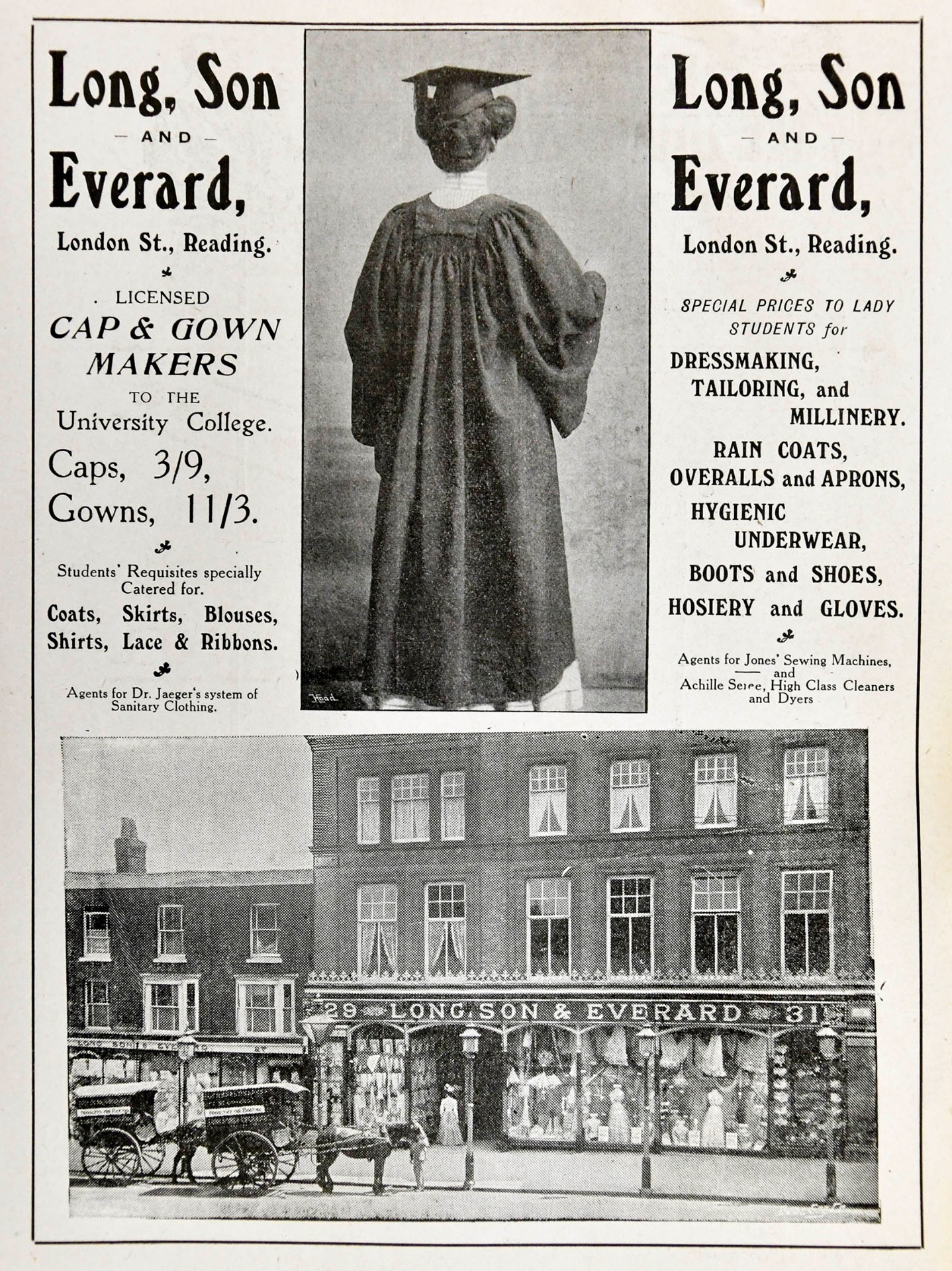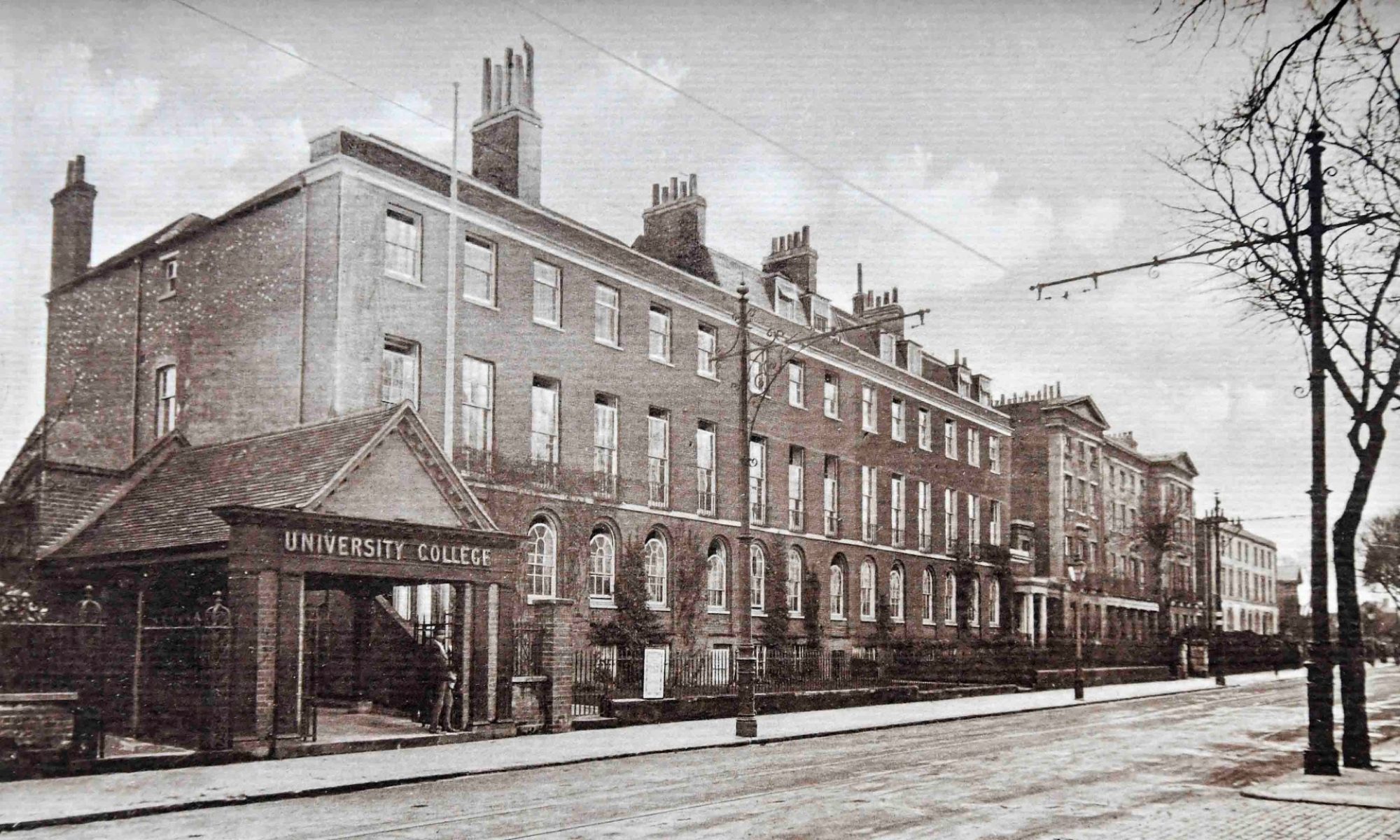In a post of 19th June 2022, I referred to documents from 1921 and 1926 that stressed the rule that women students should wear academic dress on and off campus. Later in the same decade this was again a cause of dissent.
As can be seen from the images below, caps and gowns were a long-standing tradition at Reading.


In 1927, however, the year following the granting of the Royal Charter, a flurry of items appeared in Tamesis, the official magazine of the University that raised gender issues. Two of these mention academic dress; and both appear under pseudonyms.
An article by ‘senex’, lent term 1927
The first item, with the title ‘Gowns, Schoolgirls–and Others’ was published in the Lent Term issue. It was a lengthy, and semi-humorous diatribe, that accused the student body, both male and female, of submitting too readily to petty rules and regulations, particularly with regard to academic dress.
The arguments ran as follows: gowns were an anachronism in a recently-established university like Reading; the only reason for using them as a marker of status was sheer snobbery; they were of no other practical use; they were an impediment when raising one’s glass at the bar; they were ‘drab, monotonous and unbeautiful’ – gowns and caps masked the attractiveness of one’s clothes and hairstyle, especially for women.
The writer also points out that the rule about wearing cap and gown “down town” applied to women only, and their acquiescence is criticised:
‘But, mark you, no such drastic ordinance was issued to the men. O, sisters, fie, for shame! Where is your feminine independence, to allow without protest such disgraceful discrimination against your sex?’ (p. 180).
The article concludes with an appeal to all students to:
‘refuse any longer to insult your aesthetic tastes by obeying the antiquarian dictates of the older generation.’ (p. 181).
The signature (‘Yours in sorrow’) is of SENEX (a wise old man): presumably a male, possibly a mature or postgraduate student, or maybe even a member of academic staff. Who knows?
A letter from ‘Felicissimus’, Summer Term 1927
The second item is a letter to the Editor of Tamesis. It addresses equal rights and the restrictions on women students’ freedom of movement and dress code. Such constraints are felt to be inappropriate for ‘a modern University’, yet:
‘Our seven hundred odd women servilely accept the most tyrannous restraints, whilst the small band of men are heartily amused … A woman must wear cap and gown at all times – lucky man !’ (p. 225).
While complaining of expectations that women should always behave like ladies (except on the sports field!), ‘Felicissimus’ also appears to be critical of pressures from academia to reject marriage and motherhood.
The historical Felicissimus was a male who led an uprising in Ancient Rome. I assume that, here, a female student is using it as a badge of her revolutionary credentials.
Postscript on the language used by senex
-
- At one point in the article, Senex refers to women students disparagingly as ‘undiegraduettes’. I have come across this word several times in issues of Tamesis during this period. The usage is patronising, misogynistic and offensive. I don’t know whether the coinage is unique to Reading, but I have been unable to find any citation elsewhere, whether through Google or in the Oxford English Dictionary.
- I was surprised to find the phrase ‘down town’, even placed between introverted commas and written as separate words. I had regarded it as a much more recent import from North American English, becoming more mainstream as the title of a popular song in 1964. The Oxford English Dictionary, however, includes a British citation in Parliamentary Papers from as early as 1901.
Sources
‘Felicissimus’ (1927). Letter to the Editor, 7th June. Tamesis, Vol. XXV. Summer Term. No. 10, p. 225.
‘Senex’ (1927). Gowns, Schoolgirls–and Others. Tamesis, Vol. XXV. Lent Term. No. 9. pp. 180-81.
University College Magazine, 1908, Vol. VIII. Autumn Term, No. 1 (unnumbered pages of advertisements).
University of Reading Special Collections. University History MS 5305 Photographs – Groups, Whiteknights Aerial, Halls, Agri – land – aerial – horticulture/farming.
